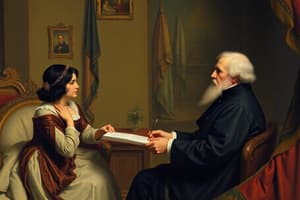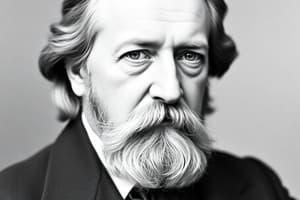Podcast
Questions and Answers
Rihards Vāgners was born on May 22, 1813, in ______.
Rihards Vāgners was born on May 22, 1813, in ______.
Vāgners lost his father at an early age and his mother remarried an actor named ______.
Vāgners lost his father at an early age and his mother remarried an actor named ______.
Vāgners was one of the greatest reformers of ______.
Vāgners was one of the greatest reformers of ______.
His first completed opera was titled ______.
His first completed opera was titled ______.
At the age of 20, Vāgners began working as a choir conductor in ______.
At the age of 20, Vāgners began working as a choir conductor in ______.
From 1837 to 1839, he worked as the music director of the Rīga City ______ (Stadt Theater).
From 1837 to 1839, he worked as the music director of the Rīga City ______ (Stadt Theater).
Wagner completed the opera ______ while living in Paris from 1839 to 1842.
Wagner completed the opera ______ while living in Paris from 1839 to 1842.
He served as the conductor of the Dresden Court ______ from 1842 to 1849.
He served as the conductor of the Dresden Court ______ from 1842 to 1849.
To avoid arrest, Wagner was forced to flee to ______ after becoming involved in political activities.
To avoid arrest, Wagner was forced to flee to ______ after becoming involved in political activities.
In 1876, Wagner's private opera house in ______ was inaugurated with a performance of 'Das Rheingold'.
In 1876, Wagner's private opera house in ______ was inaugurated with a performance of 'Das Rheingold'.
The main expressive medium in opera is the ______.
The main expressive medium in opera is the ______.
A notable feature of opera is the inclusion of ______ and choirs.
A notable feature of opera is the inclusion of ______ and choirs.
Wagner's orchestras are considered one of the greatest achievements of ______ music.
Wagner's orchestras are considered one of the greatest achievements of ______ music.
The Siegfried's music drama is part of the Nibelung ______.
The Siegfried's music drama is part of the Nibelung ______.
The ______ tuba is a combination of a horn and a trombone.
The ______ tuba is a combination of a horn and a trombone.
The character Tanheizer is based on ______ who lived in reality.
The character Tanheizer is based on ______ who lived in reality.
The scenario of the opera involves a knight who regrets his actions in the realm of the goddess ______.
The scenario of the opera involves a knight who regrets his actions in the realm of the goddess ______.
Wagner's librettos are based on German ______ related to Tanheizer.
Wagner's librettos are based on German ______ related to Tanheizer.
The bass trumpet is a combination of a trumpet and a ______.
The bass trumpet is a combination of a trumpet and a ______.
Tanheizer’s story involves seeking ______ for his sins from the Pope.
Tanheizer’s story involves seeking ______ for his sins from the Pope.
Flashcards
Richard Wagner's influence on composers
Richard Wagner's influence on composers
Richard Wagner significantly impacted subsequent composers, particularly in opera, through his innovative compositions.
Wagner's role as an operatic innovator
Wagner's role as an operatic innovator
Wagner was a major reformer of opera, impacting its structure and style.
Wagner's multiple roles in music
Wagner's multiple roles in music
Beyond composing, Wagner was also a music critic, theorist, and a conductor.
Wagner: composer and lyricist
Wagner: composer and lyricist
Signup and view all the flashcards
Wagner's early and later life contrasting ideas
Wagner's early and later life contrasting ideas
Signup and view all the flashcards
Wagner's Rīga period
Wagner's Rīga period
Signup and view all the flashcards
Wagner's move to Paris 1839-1842
Wagner's move to Paris 1839-1842
Signup and view all the flashcards
Wagner's Dresden Direction
Wagner's Dresden Direction
Signup and view all the flashcards
Wagner's exile in Switzerland
Wagner's exile in Switzerland
Signup and view all the flashcards
Wagner's Bayreuth Opera
Wagner's Bayreuth Opera
Signup and view all the flashcards
What was Wagner's primary musical focus?
What was Wagner's primary musical focus?
Signup and view all the flashcards
Recitative Singing
Recitative Singing
Signup and view all the flashcards
Leitmotif
Leitmotif
Signup and view all the flashcards
Orchestral Dominance
Orchestral Dominance
Signup and view all the flashcards
Wagnerian Orchestra
Wagnerian Orchestra
Signup and view all the flashcards
What was the largest orchestra Wagner used?
What was the largest orchestra Wagner used?
Signup and view all the flashcards
Wagner's Key Musical Addition
Wagner's Key Musical Addition
Signup and view all the flashcards
What makes the Bayreuth Festspielhaus unique?
What makes the Bayreuth Festspielhaus unique?
Signup and view all the flashcards
Wagner Tuba
Wagner Tuba
Signup and view all the flashcards
Bass Trumpet
Bass Trumpet
Signup and view all the flashcards
Study Notes
Richard Wagner (1813-1883)
- German composer significantly impacting subsequent generations, especially in opera
- One of the greatest opera reformers
- Innovative composer
- Author and playwright of his own operas
- Leading conductor
- Music critic and publicist
- Theorist of his art form
- Complex and contradictory figure
- Born May 22, 1813, Leipzig, Germany
- Died February 13, 1883, Venice, Italy
- Parents: Johanna and Karl Friedrich Wagner (police official)
- Ninth child in the family
- Father died young
- Mother remarried to actor Ludwig Geyer, moving to Dresden
- Early exposure to the theatre
- Studied at Kreuzschule in Dresden (from 1821)
- Studied music with various private teachers in Leipzig
- Studied harmony and conducting under Christian Gottlieb Miller (1828-1831)
- Held conducting positions in Würzburg and Magdeburg
- Worked as a chapel master in Königsberg (1836)
- Held music director positions in Riga from 1837 to 1839
- Married Christine Wilhelmine Planer (Minna) in 1836
- Composed first completed Symphony in D major at 19 years old
- Studied at Leipzig University alongside composition studies (1831)
- Lived in Würzburg and Magdeburg in his early adulthood
- Lived in Königsberg as a chapel master (1836)
- Held positions in Riga (1837-1839)
- Spent time in Paris (1839-1842) earning a living through writing and copying scores for other composers
- Lived in Dresden as the court opera conductor (1842-1849)
- Forced to flee to Switzerland for political reasons (1849)
- Lived in Zurich and Lucerne
- Family moved to Triebschen villa (1864), where he founded the Bayreuth Festspielhaus
- Founded the Bayreuth Festival
- Married Cosima von Bülow in 1870
- Founded the Bayreuth Festival Theatre, which opened in 1876
- Lived in Bayreuth with his family until his death in 1883
- Buried in Bayreuth
Wagner's Notable Works
- Included numerous operas, including The Ring of the Nibelungs, Tristan und Isolde, Die Meistersinger von Nürnberg, and Parsifal.
- Known for innovative musical language that challenged conventions at time
Wagner's Style
- Emphasis on orchestral richness and complexity
- Use of leitmotifs
- Combination of music and drama
- Use of larger orchestra with significant importance placed on brass and wind instruments
- Operatic works
- Orchestral works
- Music dramas
Studying That Suits You
Use AI to generate personalized quizzes and flashcards to suit your learning preferences.




